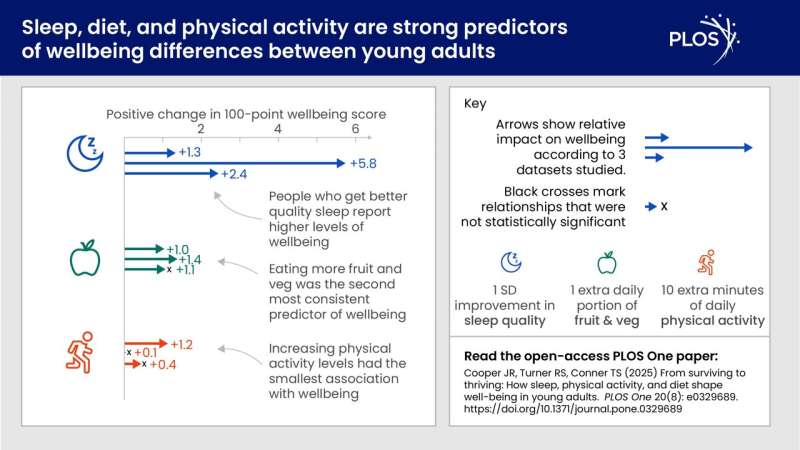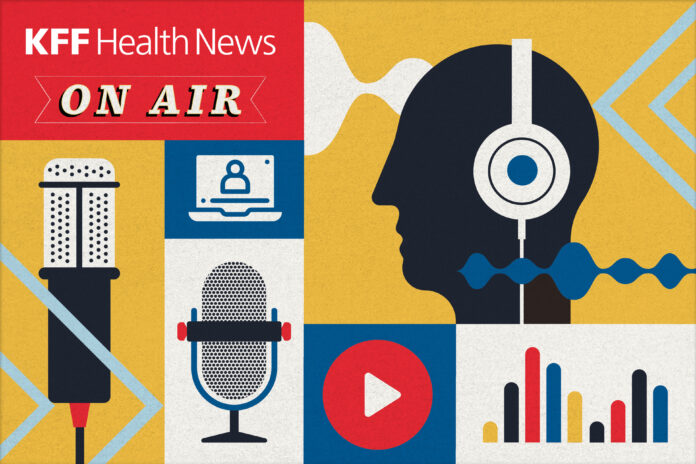A new study of young adults has strongly linked better sleep quality with better mental well-being, with fruit and vegetable consumption and physical activity also strongly associated with psychological well-being. Perhaps surprisingly, the findings also suggest that boosting fruit and vegetable intake could potentially help mitigate the effects on well-being after a poor night’s sleep.
Dr. Jack Cooper, previously from the University of Otago, New Zealand, and colleagues present these findings in the open-access journal PLOS One.
Prior research has linked better health behaviors—actions that people can adjust in their lives—to better physical health. Evidence also suggests that health behaviors may be linked to mental well-being.
However, research on this topic has been limited. For example, studies have typically focused only on mental illness, a separate measure from positive psychological well-being, and they typically neglect to consider how different health behaviors might interact to affect well-being.
To address these and other gaps, Cooper and colleagues analyzed relationships between three health behaviors—sleep quality, eating fruits and vegetables, and physical activity—and psychological well-being in adults aged 17 to 25.
They used data from three studies: a survey study of 1,032 adults in New Zealand, the U.K., and the U.S.; a 13-day study of 818 New Zealand adults who were asked to keep a daily diary; and an eight-day diary study of 236 New Zealand adults who also wore Fitbits tracking physical activity.
Across all three studies, better sleep quality was most strongly associated with better mental well-being, with fruit and vegetable consumption coming in second. Both behaviors showed benefits even when comparing between different days for the same person—so eating more fruit and vegetables one day was associated with a real-time well-being boost.
Physical activity—whether measured by Fitbits or diaries, which aligned—was also linked to better well-being, but mostly when comparing between days for an individual rather than when comparing across individuals.

Links between each of the three behaviors and well-being appeared to be independent and additive—which might mean that the more of them you do, the bigger the well-being benefit. The only exception: above-average intake of fruits and vegetables appeared to mitigate the effects of a poor night’s sleep, and a good night’s sleep appeared to protect against lower fruit and vegetable intake.
This study used samples of young adults from three countries—the U.K., U.S., and New Zealand—and sample sizes were relatively homogeneous. Future research could address some of these limitations by including participants from additional countries and increasing the sample size to improve generalizability.
Although this study could not prove a causative link between these behaviors and mental well-being, the authors hope that their findings could inform efforts to improve psychological well-being of young adults.
Lead author Dr. Jack Cooper adds, “Young adults don’t have to reach some objective benchmark of healthiness to see well-being improvement. Sleeping a little better, eating a little healthier, or exercising even for 10 minutes longer than you normally do was associated with improvements to how you feel that day.”
Senior author Professor Tamlin Conner, of the University of Otago Psychology Department, adds, “Of these healthy habits, sleep quality stood out as the strongest and most consistent predictor of next-day well-being, but eating fruit and vegetables and being active also helped boost well-being.
“This age group faces unique pressures—such as leaving home, financial stress, educational pressures and social stressors—that can lower happiness. Understanding what lifestyle factors support well-being can help young adults not just ‘get by’ but thrive during this critical life stage.”
More information:
Cooper JR, From surviving to thriving: How sleep, physical activity, and diet shape well-being in young adults, PLOS One (2025). DOI: 10.1371/journal.pone.0329689
Public Library of Science
Citation:
Eating more fruits and vegetables may offset poor sleep’s impact on well-being (2025, August 27)
retrieved 27 August 2025
from https://medicalxpress.com/news/2025-08-fruits-vegetables-offset-poor-impact.html
This document is subject to copyright. Apart from any fair dealing for the purpose of private study or research, no
part may be reproduced without the written permission. The content is provided for information purposes only.
